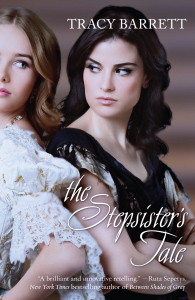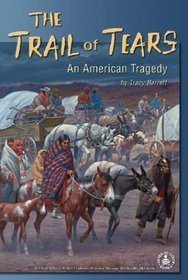Banned Books Month: Guest Post from Tracy Barrett: Censorship Inside Publishing
As far as I know, none of my books have been challenged—although more than one librarian has told me she couldn’t booktalk my middle-grade novel ON ETRUSCAN TIME because its twelve-year-old protagonist says “Damn” twice—but banning is only one kind of censorship. Some books don’t make it to the shelves, or even to the printer, before they’re shut down. That nearly happened to a project that was dear to my heart.

Harlequin Teen, June 2014.
I now write mostly young-adult historical fiction, but at the beginning of my career I concentrated on nonfiction for middle-grade readers. A highly-respected publisher was starting a new series and asked if any of the topics in its list appealed to me. When I saw that they wanted a book on the Indian Removal Act (the Trail of Tears), the forcible and brutal removal of large numbers of Native Americans from the southeastern United States to Oklahoma under orders of President Andrew Jackson, I leaped on it.
I live in Tennessee, through which many of these people were forced to travel (there was more than one “trail”), but my interest in this shameful episode in our nation’s history started long ago, when I learned that an ancestor of mine named Elizur Butler had served as a missionary and physician to the Cherokees in Georgia. He and the better known Samuel Worcester were imprisoned at hard labor for defending the rights of the Cherokees. They were pardoned but refused their pardons in order to force the case to the United States Supreme Court, which declared their imprisonment illegal. On his release, Butler accompanied the Cherokees on foot to Oklahoma, where he settled and served as professor of theology at the Cherokee Female Seminary, the first institution of higher education for women west of the Mississippi. His pardon, and Samuel Worcester’s, finally became effective in 1992.
So I felt a personal stake in the story, and researched it thoroughly and carefully before sending it to the publisher.
They liked the manuscript except for one thing: they told me that I had been too hard on Andrew Jackson, that the Indian Removal Act wasn’t out of line with the standards of the day, and that Jackson had merely been a man of his times. I protested, sending them copies of contemporary newspaper articles and editorial cartoons fiercely opposed to this action, and pointing out that the debate over the Indian Removal Act was the longest on record in the American Congress. The publisher still told me to soften my portrayal of Jackson. I refused, saying “genocide is genocide” and offered to cancel the contract and send them back their advance.
That was very, very hard. Finding someone to publish your manuscript is difficult, and this was a story I was eager to retell, with a publisher that produces beautiful books that receive awards and sell well. But I just couldn’t give in.
They returned my check, and shortly afterwards I was lucky enough to find another excellent home for the book. That publisher, Perfection Learning Corporation, sent the manuscript to a publicist at the Cherokee Nation for fact-checking. The publicist was complimentary about my research and how I had told the story, but she said that I had portrayed the Cherokees too negatively.
Déjà vu all over again!
I reminded my editor that one of the most tragic aspects of the way Native peoples have been treated is that they were relentlessly “Europeanized,” with their customs and culture stripped away from them. In a cruel twist, once that happened, their conquerors refused to accept them as fellow members of their own dominant society, leaving them with neither one nor the other. In showing the aspects of the pre-conquest Cherokee culture, I had to present the bad with the good (“bad” being defined in modern, European terms), and the fact is that the Cherokees were feared by their neighbors. They were, to our eyes, often brutal in warfare, burning captives alive and having their children pour water on the flames if the victim was dying too quickly. In at least one case, members of another tribe, realizing that they were about to be defeated by a band of Cherokees, committed mass suicide rather than face these fearsome enemies. (I didn’t go into such gory detail in the manuscript, but I alluded to these facts.)

Jossey-Bass, June 2000.
Apparently the reader of the manuscript wanted me to cut out everything that looked bad to modern eyes, leaving the impression that the Cherokees inhabited a kind of Garden of Eden, living in peace and harmony with nature and with other people.
I refused to perpetuate this patronizing, “noble savage” view of the Cherokees and told my editor I wouldn’t make those cuts.
To her credit, she immediately agreed, saying that she had wanted me to be aware of the concerns of the outside reader and that as long as I had good documentation (I did), I was free to present this view.
Most nonfiction books for young readers go out of print quickly. THE TRAIL OF TEARS: An American Tragedy has been in print with Perfection Learning since 2000. I’ve never heard from any reader, Cherokee or Andrew Jackson fan, that one side or the other was presented unfairly.
Tracy Barrett is the author of numerous books for young readers, including the award-winning biographical novel, ANNA OF BYZANTIUM (Delacorte, 1999). Her most recent publications are a Cinderella retelling (THE STEPSISTER’S TALE, Harlequin Teen, 2014); two young-adult novels, DARK OF THE MOON (Harcourt, 2011) and KING OF ITHAKA (Henry Holt, 2010), and the four books in a middle-grade series, The Sherlock Files (Henry Holt). Nonfiction includes THE ANCIENT GREEK WORLD and THE ANCIENT CHINESE WORLD (Oxford University Press). Tracy was the Society of Children’s Book Writers and Illustrators’ Regional Advisor for the Midsouth from 1999 to 2009 and is now SCBWI’s Regional Advisor Coordinator. She was awarded the SCBWI Work-in-Progress Grant in 2005 and a grant from the National Endowment for the Humanities in 1994. She holds a B.A. with Honors in Classics from Brown University, and an M.A. and Ph.D. in Medieval Italian Literature from the University of California at Berkeley. She lives in Nashville, TN, where until recently she taught at Vanderbilt University.
Web site: www.tracybarrett.com
Facebook: https://www.facebook.com/TracyBarrettAuthor?ref=hl
Twitter: @writingtracy








